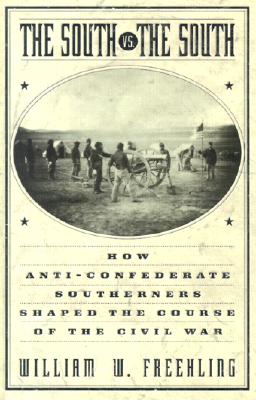

 Oxford University Press, USA
Oxford University Press, USA
The South vs. the South: How Anti-Confederate Southerners Shaped the Course of the Civil War


Key Metrics
- William W Freehling
- Oxford University Press, USA
- Hardcover
- 9780195130270
- 9.58 X 6.45 X 0.95 inches
- 0.96 pounds
- History > United States - Civil War Period (1850-1877)
- English
 Secure Transaction
Secure TransactionBook Description
William Freehling argues that anti-Confederate Southerners--specifically, border state whites and southern blacks--helped cost the Confederacy the war. White men in such border states as Missouri, Kentucky, and Maryland, Freehling points out, were divided in their loyalties--but far more joined the Union army (or simply stayed home) than marched off in Confederate gray. If they had enlisted as rebel troops in the same proportion as white men did farther south, their numbers would have offset all the Confederate casualties during four years of war. In addition, when those states stayed loyal, the vast majority of the South's urban population and industrial capacity remained in Union hands. And many forget, Freehling writes, that the slaves' own decisions led to a series of white decisions (culminating in the Emancipation Proclamation) that turned federal forces into an army of liberation, depriving the South of labor and adding essential troops to the blue ranks.
Whether revising our conception of slavery or of Abraham Lincoln, or establishing the antecedents of Martin Luther King, or analyzing Union military strategy, or uncovering new meanings in what is arguably America's greatest piece of sculpture, Augustus St.-Gaudens' Shaw Memorial, Freehling writes with piercing insight and rhetorical verve. Concise and provocative, The South Vs. the South will forever change the way we view the Civil War.
Author Bio
William Freehling grew up in Chicago, received his A.B. degree Magna Cum Laude and Phi Beta Kappa from Harvard College (where he wrote his honors thesis under Arthur Schlesinger Jr.), and his M.A. and Ph.D. from the University of California, Berkeley (where he wrote his Ph.D. thesis under Kenneth Stampp). He has taught at Berkeley and Harvard, held full professorships at Michigan and Hopkins, and endowed chairs at SUNY, Buffalo and at Kentucky.
Now retired from a university career that brought him as many honors for teaching as for books, Mr. Freehling currently writes full time at the Virginia Foundation for the Humanities as a permanent Senior Fellow. His latest publication is Showdown in Virginia: The 1861 Convention and the Fate of the Union (2010). His current projects include a sesquicentennial book of essays on the cause of the American Civil War and a biography of Abraham Lincoln.
In 2007, the Oxford University Press published the second and concluding volume of Professor William W. Freehling’s Road to Disunion, subtitled Secessionists Triumphant, 1854-1861 (a main selection of the History Book Club, a Washington Post Notable Book of the year, a New York Times Sunday Book Review Editor’s Choice, and winner of the Hodges Prize).
The first volume of Road to Disunion, subtitled Secessionists at Bay, 1776-1854 and published in 1990, was also a History Book Club main selection and was winner of the Owsley Prize. Together with The South versus the South: How Southern Anti-Confederates Shaped the Course of the Civil War (appearing in 2002 and winner of the Jefferson Davis Prize), The Road to Disunion reinterprets the causes of the Civil War and of Confederate defeat.
These books, researched on a Guggenheim Foundation fellowship, bring to climax a lifetime’s work on the Old South, begun forty years ago with the publication of Prelude to Civil War; The Nullification Controversy in South Carolina (winner of the Nevins and Bancroft Prizes).
Source: John Simon Guggenheim Memorial Foundation
Videos
No Videos
Community reviews
Write a ReviewNo Community reviews